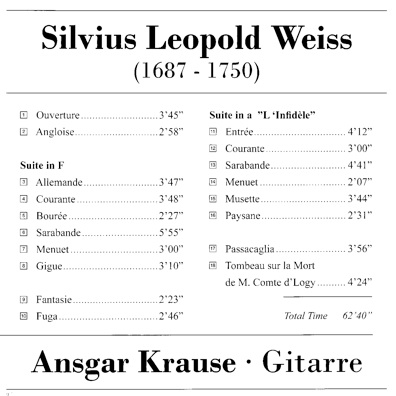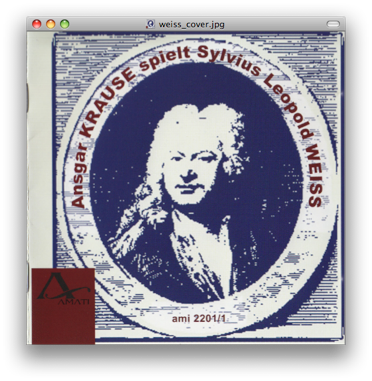The New Sound of Silvius Leopold Weiss
(on the Guitar)

Only a small number of this vast amount of Weiss’ compositions succeeded in figuring in the repertoire for the guitar. In concerts or on CDs you may listen to the same well-known fantasy or passacaglia again and again, although for guitarists, who are constantly looking for new scores, there is an enormous wealth of sonatas and single pieces at hand.
The reason for this imbalance is mainly to be found in the different ways the baroque lute and the guitar are tuned. In the top courses (with the lute you speak of courses as there are pairs of strings) the baroque lute is tuned in a pervasive d-minor chord that leads on to the bottom courses in a descending scale. This tuning permits an elegant performance, which exploits the instrument’s resonance ideally with easy stops. On the guitar, which is tuned in fourths with the exception of a major third between the second and third string, performing Weiss’ music demands extremely awkward runs that give a very dry sound impression, which is reminiscent of the sound of a piano played with no use of the pedals at all.
But how can Weiss’ compositions be performed on the guitar?
The answer is that a truly satisfactory interpretation does not require that the player adapt to the way a baroque lute is played, but that he should tune his guitar as closely as possible to the tuning of the baroque lute. With the majority of the pieces Ansgar Krause combines familiar scordatura for the guitar with the application of a partial capo; so the (transposed) tuning of the baroque lute is accomplished on the upper four open strings.
Thus, the elaborated changes to the resonance of the instrument, tasteful use of vibrato and sophisticated techniques of execution, elegant ornamentation and arpeggio passages – all of which suggesting a greater number of strings than there are – help to adapt the music of Silvius Leopold Weiss convincingly so that the effect of the guitar versions is clearly natural and authentic.
(Hans-Werner Huppertz, translated by Wilhelm Lohmann)
The CD can be ordered directly from Ansgar Krause.
Here are some excerpts to listen to:
from Suite in F:
from Suite in A minor „L‘Infidele“:
